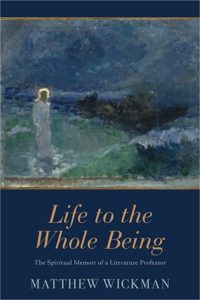Review
———
Title: Life to the Whole Being: The Spiritual Memoir of a Literature Professor
Author: Matthew Wickman
Publisher: Neal A. Maxwell Institute for Religious Scholarship
Genre: Memoir
Year Published: 2022
Number of Pages: 248
Binding: Paperback
ISBN: 978-0842500616
Price: $19.95
Reviewed by Conor Hilton for the Association for Mormon Letters
I am perhaps the platonic ideal of a reader of Life to the Whole Being: The Spiritual Memoir of a Literature Professor by Matthew Wickman. That is to say, I’m pursuing a Ph.D. in English literature, studying religion, spirituality, and secularity. I have experienced a faith crisis and find myself in the midst of an ongoing, perpetual faith remodel. And I am lucky to count Matt as a friend and mentor, having taken a couple of iterations of his spirituality and literature course during my undergrad and MA at BYU, as well as having the pleasure of working closely with him on my MA thesis. Life to the Whole Being is a wonderful, insightful, often delightful, and touching addition to the Maxwell Institute’s Living Faith series.
Matt’s book is part literary analysis, part personal narrative, part theological reflections, all wrapped together into a “spiritual memoir.” The focus of the book is Matt’s own spiritual journey, reflected through Matt’s engagement with particular moments and experiences that have been significant in the shaping of that journey, as well as analysis of various literary texts that have played a major role.
I was struck continually with insights that felt significant, but I’ll highlight three ideas that seem particularly powerful and key to the themes that Matt explores throughout the book. The first is a description of why Matt has come to value the ‘clunkiness’ of lived religion. Matt says that:
“The awkwardness of religion is crucial, actually, as there is an eloquence of metaphor that speaks through it, a conversion of this (plain sermon or fellow congregant) into that (instrument and image of the divine). When these conversions occur, I find myself marveling at the sublime juxtaposition of God on earth, a union associated across Christianity with the singular event of Christ’s incarnation, though registered by me, here, as a common quality of religious experience. This is the Spirit at work in human lives one covenant, ordinance, and practice at a time, time after time—the gift of the Holy Ghost bestowed, rhythmically, by way of the Church.” (53)
I love this. I have also felt the Spirit come through these awkward, clunky moments of lived religion—of engaging in the rituals even if, or when, you don’t want to, or aren’t ‘feeling it’. I have tasted of this grace, this Spirit, and am always grateful for it. I have not and do not always find this ‘clunkiness’ moving and spiritually touching. But sometimes it truly is.
Much of Life to the Whole Being describes the variety of experiences that Matt has had, which he would file under “Holy Saturdays”, drawing on the Gospel narrative of Holy Week and the liturgical tradition developed to honor it. In one of these moments, Matt is thinking about finding God when there is no clear divine intervention in our lives when we feel abandoned and alone. He says:
“I suppose I’m one for whom truth begins once my sense of rightness expends itself—in some cases, once it’s beaten out of me. I then find myself standing a little more humbly alongside others in an attitude of prayer, pleading that God will see us on our Holy Saturdays, dazed but still waiting. Waiting on the Lord.” (123)
I feel something true about this and wonder how often I need to let my own sense of rightness expend itself to find truth, to let go of my own limited, narrow understanding of what is good and beautiful to make room for the marvelous, wonderful, upside-down Kingdom of God.
These wonderings were brought even more to the forefront of my mind when I read what I think is my favorite passage from the entire book. It comes after Matt has learned that his daughter has moved in with her girlfriend and removed her name from the records of the Church. It’s a bit lengthy, but worth it, I think, so bear with me:
“I found that these latest answers took an old, familiar form: gentle irony. A light from a corner of my darkness. A soft voice echoing through deep canyons of the ominous and unknown. I was anguished, and God was not. I mourned the prospect of lost futures for my children, and God did not. I expressed regret, and God would have none of it.
I lack a language for the strange hopefulness of these spiritual ministrations, for the joy it seemed God expressed, and expresses still on my behalf even if I could not, cannot, feel it myself.” (156-57)
Wow. I am deeply drawn to this image of God, who refuses to accept the regrets and mourning that we experience at the choices of others. A God who seems to feel joy for the good in others’ lives, for and in behalf of us. A God who calls us to join in on this joy, to realize that perhaps what we are mourning is causing us to miss the depth and breadth of the wonder of God’s creation.
I loved Life to the Whole Being: The Spiritual Memoir of a Literature Professor. I have not and do not often feel or hear God in quite the same way that Matt narrates throughout the book, but I share much of his disposition and affect, often seeing myself in the relationship that he describes between himself, the Church, and his faith. I hope that many others (even if they aren’t the platonic ideal of its readers) can find their way to this lovely book and wrestle with Matt’s story and ideas, gleaning some truth and insight along the way.

